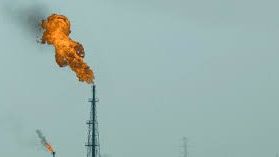The US may be on the precipice of a military confrontation with Iran, but the economic war is nothing new.
The history of US sanctions on Iran dates back to the 1979 hostage crisis. Then, as now, Iran was willing to weather short term economic pain rather than capitulating to the United States. But Iran is no longer negotiating from a position of strength.
The economic consequences of the current US, UN and EU sanctions have not been confined to the oil industry or banking sector. Iranian communities are feeling the pinch, with Gallup reporting a record 57 per cent of Iranians said they saw economic conditions worsening since US sanctions were reimposed in May 2018. Rampant inflation is causing steep declines in the value of the rial and has seen the cost of living soar. Persistent economic malaise manifested itself in widespread anti-government protests in Iran in December 2017.
Iran’s former position as a market disruptor has been diluted, thanks to the US shale revolution that unlocked global oil supplies in addition to fears of a global economic slowdown that have combined to suppress spikes and keep oil prices low. But it would be naïve to assume this will be enough to force regime change in Iran. Deeply ingrained hostility towards the United States, fomented by propaganda, means Tehran is once again banking on public willingness to swallow hardship and survive in an “economy of resistance”.
Since pulling out of the Obama-era nuclear deal (the JCPOA) in May 2018, the hawks in Trump’s inner circle have been ratcheting up the rhetoric and sanctions on Iran. With the decision not to reinstate temporary waivers that allowed certain firms and countries including China to import oil from Iran, the Trump administration has made no secret of its goal to “bring Iran’s oil exports to zero”.
This time though, the economic case for the rest of the world to fall in behind the US is harder to rationalise. The unravelling of the JCPOA presents what game theorists would call a classic Prisoner’s Dilemma: cooperation is more lucrative in the long run if it can be sustained, but once the US deviated from cooperation by backing out of the deal, the rational choice for Iran was to begin enriching uranium beyond agreed-upon limits. In the same way, sanctions regimes are only effective if everyone agrees to cooperate. But with Europe under pressure to help the Iranian economy, and China and other trading partners in a difficult spot now that waivers have not been reinstated, cooperation is looking less likely than before.
Although corporations and countries have a strong incentive to toe the line to avoid facing US sanctions themselves, at a time when most indicators point to a likely economic downturn there is little appetite to create costly enemies.
In a bid to ease tensions, US allies Germany, France and the UK – all key European signatories to the JCPOA – have already devised a workaround; a limited barter-trade mechanism with Iran, dubbed INSTEX. And as for China, itself the subject of extensive US tariffs and in the midst of its own slowdown, the imperative is to keep the oil flowing to sustain the economic growth that has assured political stability at home. That’s why in the past few weeks Chinese state-owned enterprises like Zhuhai Zhenrong have continued importing Iranian oil, despite incurring economic penalties from Washington.
Seventy-five years ago this week, the Bretton Woods system ushered in an era where dollars dictated geopolitics more so than ever before. But for as often as we hear about the liberal international economic order in terms of the power of markets to unlock productivity and lift millions out of poverty, it is important to acknowledge the other side of the coin. The use of tariffs and sanctions as policing tools against countries like Iran has been as much a part of the story as economic liberalisation measures. Indeed, President Trump’s brand of economic diplomacy is less about speaking softly than it is about carrying a big stick.
With economic headwinds on the horizon, it’s far from clear that the rest of the world will follow the US down the warpath in Iran.






